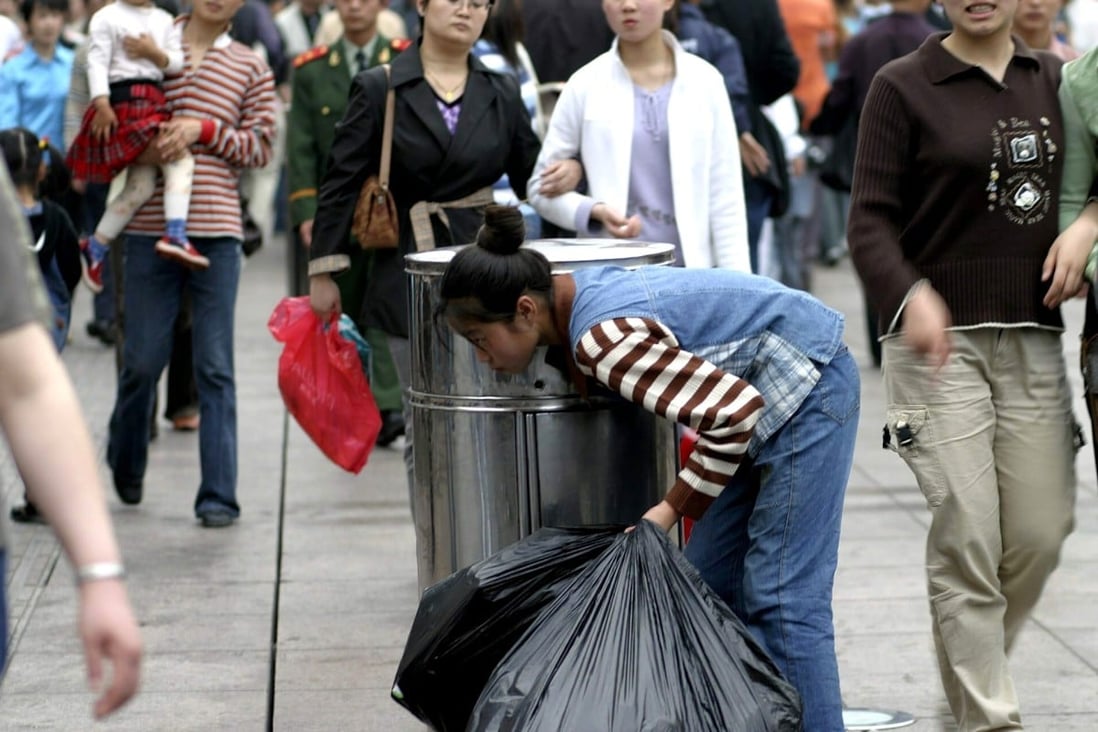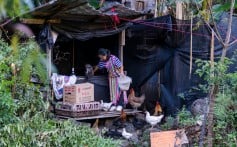China’s minimum living standard guarantee, known as ‘dibao’, was conceived as a social safety net to help the poor during a period of reform in the 1990s
But over time it has transformed into a means to control ‘targeted populations’ and repress social unrest, says Jennifer Pan, from Stanford University

China’s minimum living standard guarantee, known as ‘dibao’, provides unconditional cash transfers and benefits to the poor.
Photo: EPA
The role of China’s social safety net programme, known as dibao, has shifted over time from providing support to the poor and vulnerable to being used partly as a tool to repress dissent, according to research from a US-based social scientist.
The minimum living standard guarantee is China’s sole social security programme targeted at reducing income inequality. The scheme provides unconditional cash transfers and benefits to recipients whose income falls under a threshold set by local governments.
But what has long puzzled scholars – and many dibao applicants – is its opaque and seemingly inconsistent eligibility standards. A 2012 study from Chinese Academy of Social Sciences found that only 20-30 per cent of households entitled to the benefit ended up receiving it.
Photo: EPA
The role of China’s social safety net programme, known as dibao, has shifted over time from providing support to the poor and vulnerable to being used partly as a tool to repress dissent, according to research from a US-based social scientist.
The minimum living standard guarantee is China’s sole social security programme targeted at reducing income inequality. The scheme provides unconditional cash transfers and benefits to recipients whose income falls under a threshold set by local governments.
But what has long puzzled scholars – and many dibao applicants – is its opaque and seemingly inconsistent eligibility standards. A 2012 study from Chinese Academy of Social Sciences found that only 20-30 per cent of households entitled to the benefit ended up receiving it.
Jennifer Pan, author of the recently published Welfare for Autocrats, which introduces the idea of “repressive assistance” in China, thinks she may have struck on an explanation.
In its early years, dibao was used mainly to help reduce urban poverty as reform of state-owned enterprises led to mass lay-offs in the 1990s. But the programme gradually became part of Beijing’s regime to maintain stability in the 2000s, following crackdowns on practitioners of Falun Gong, a spiritual movement considered an evil cult.
“What’s unique about dibao is that over time, especially following the Falun Gong protests in 1999, you see a change in how the Chinese government thinks about stability - how important it is, what its relationship to economic development means, as well as how to pursue it,” said Pan, an assistant professor of communication at Stanford University, in an interview with the South China Morning Post.
“So there’s a comprehensive management of public security. And because of those changes, dibao is then used very specifically to control individual
As part of her field research between 2012-13, Pan interviewed dozens of government officials, as well as applicants and recipients of dibao.
“What’s unique about dibao is that over time, especially following the Falun Gong protests in 1999, you see a change in how the Chinese government thinks about stability - how important it is, what its relationship to economic development means, as well as how to pursue it,” said Pan, an assistant professor of communication at Stanford University, in an interview with the South China Morning Post.
“So there’s a comprehensive management of public security. And because of those changes, dibao is then used very specifically to control individual
As part of her field research between 2012-13, Pan interviewed dozens of government officials, as well as applicants and recipients of dibao.
You can make someone less likely to take action … by giving them material benefitsJennifer Pan
She also surveyed 100 neighbourhoods to test whether political order was tied into distribution, and conducted field experiments to show provision was not only shaped by economic considerations.
Over time, as it became clear to authorities that security alone could not guarantee political order, dibao began to be used to control what Beijing deemed “targeted populations”, including former prisoners and people considered threats to stability, Pan said.
“You can make someone less likely to take action … by giving them material benefits,” she said.
“It’s not threats or violence, it’s instead giving them very minimal resources. That keeps them in a particular socio-economic state.”
China’s Xi Jinping declares victory on poverty alleviation, but warns of ‘unbalanced’ development
4 Dec 2020

She said it was different to buying people off because it was a small amount of money and “a lot of the people receiving it are not making an exchange decision.”
“They’re not saying, OK, fine, I’ll take dibao and I won’t do this,” she said.
The level of assistance varies between provinces, but is generally lower than unemployment insurance and minimum wage. For instance, in Beijing, the government compensates you the difference between your monthly income and the dibao threshold of 1,140 yuan (US$174) per month, whereas the monthly unemployment benefit is more than 1,800 yuan, according to government data.
For instance, in Beijing, recipients get 1,140 yuan (US$174) per month, whereas the monthly unemployment benefit is more than 1,800 yuan, according to government data.
An important aspect related to social control is that benefits are low enough for people to depend on, yet not enough to enable them to mobilise against the state, Pan said.
Apart from feeling stigmatised because all dibao recipients’ names are made public, beneficiaries receive regular visits from neighbourhood party officials who keep tabs on them as part of information gathering.
The number of dibao recipients has been shrinking since 2011 in both
urban and rural areas, partly because of local government funding constraints and resistance from the public who believe welfare decreases incentives to work.
Local governments might also want to have fewer people living on dibao to show they were successfully reducing poverty, Pan said.
“When I was doing my fieldwork in 2013, I talked to local governments that were setting a cap on the number of participants, which means the programme is not based at all on fundamental economic conditions,” she said.
When Pan started her work on dibao in 2012, there was a push for local governments to be transparent and many policy documents on how to monitor “targeted populations” with social security were available online.
People who are put into targeted populations, for the most part, are those who have some history in the past that make them easy to identify for the governmentJennifer Pan
By 2019, when she reviewed her research, most of these documents had been removed from the internet.
But she said it was reasonable to believe such a campaign continued because many Chinese academic articles on using video surveillance and big data to identify these groups had been published in recent years.
“When I was doing my fieldwork in 2013, I talked to local governments that were setting a cap on the number of participants, which means the programme is not based at all on fundamental economic conditions,” she said.
When Pan started her work on dibao in 2012, there was a push for local governments to be transparent and many policy documents on how to monitor “targeted populations” with social security were available online.
People who are put into targeted populations, for the most part, are those who have some history in the past that make them easy to identify for the governmentJennifer Pan
By 2019, when she reviewed her research, most of these documents had been removed from the internet.
But she said it was reasonable to believe such a campaign continued because many Chinese academic articles on using video surveillance and big data to identify these groups had been published in recent years.
“People who are put into targeted populations, for the most part, are those who have some history in the past that make them easy to identify for the government,” Pan said.“For the most part, I think these people are very unlikely to be doing anything again, because most of them have been through the penal system.
“But at the same time, I think for a government like China, which is very different to a government like in the US, it doesn’t matter if there are a lot of people who are placed in that category who will never do anything, as long as the system is able to get the few who may do something.”
No comments:
Post a Comment